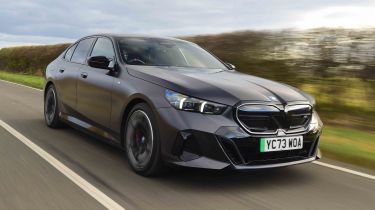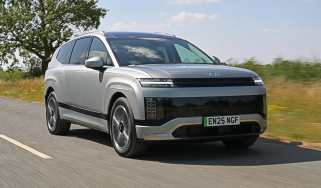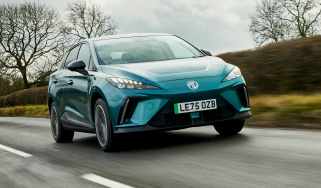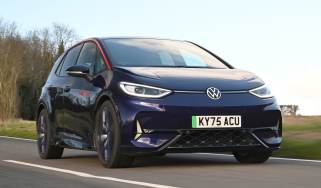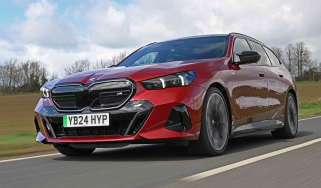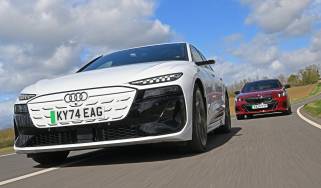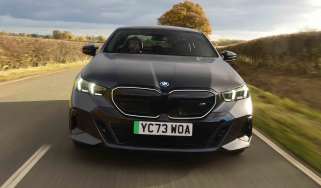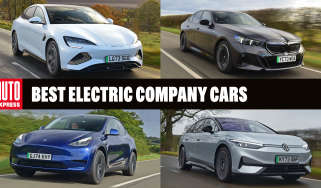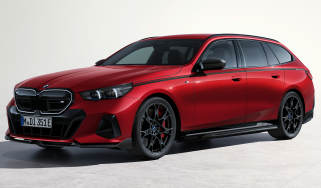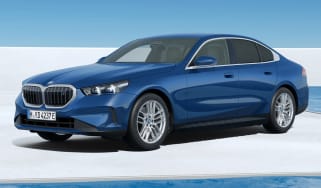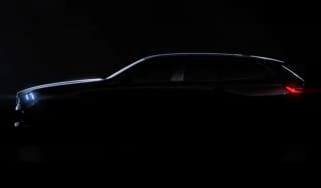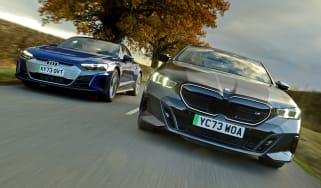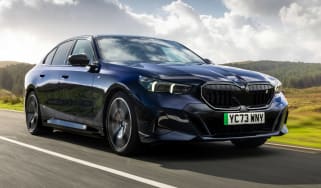BMW i5 review
Company car users will appreciate the low tax, exceptionally luxurious interior, outstanding refinement, and long range of the BMW i5

Is the BMW i5 a good car?
The BMW i5 is a highly impressive entry into the electric executive car market because it is supremely well-finished inside, comes with an array of high-end technology, and can travel around 300 miles on a single charge.
Sure, the i5 isn’t the cheapest EV around, but it’s compelling enough to make you question the even pricier i7, and we reckon it’ll provide a real challenge to the Mercedes EQE. We’d like a little improvement to overall efficiency, and it could be a touch more fun to drive, but if you’re after a refined long-distance EV, the BMW i5 is one of the more complete options.
| Key specs | |
| Fuel type | Electric |
| Body style | Four-door saloon |
| Powertrain | 81.2kWh battery, 1x e-motor (eDrive 40) rear-wheel drive 81.2kWh battery, 2x e-motor (M60) four-wheel drive |
| Safety | 5-Star (Euro NCAP, 2023) |
| Warranty | 3yrs/unlimited miles |
How much does the BMW i5 cost?
Unlike the regular BMW 5 Series, which has mild-hybrid petrol or plug-in hybrid power (the latter will have an ‘e’ at the end of the model number), the i5 is all-electric, and starts at just under £68,000 for the Sport Edition eDrive 40 version, rising to nearly £98,000 for the high-performance M60 xDrive.
Buyers prioritising practicality will find the BMW i5 Touring estate the most versatile option in the lineup. Compared to its taller SUV contemporaries, the i5 Touring should slip through the air more efficiently and provide superior electric range.
There are four trim levels to choose from: Sport Edition, M Sport, M Sport Pro, and M60. The entry-level Sport Edition undercuts the least expensive EQE 300 Sport by just over £1000. It’s our preferred version of i5 because it comes with everything you’ll need, including 19-inch wheels, adaptive LED lights, a Harman Kardon stereo, Veganza artificial leather trim, dual-zone climate control, a reversing camera, and sat-nav. The only thing missing is adjustable lumbar support for the front seats, although this can be added as an individual option for a reasonable price.
Used - available now
Next up is M Sport at just over £74,000, adding M Sport specific 19in alloys, sportier exterior and interior styling, sports suspension, and a three-spoke M Sport steering wheel. M Sport Pro comes in at a little over £77,000 with larger 20-inch alloy wheels, a black grille, and red brake calipers. The top-of-the-range M60 is the high-performance version and is very expensive, but for your money, you do get two electric motors, giving you xDrive four-wheel drive, 593bhp, and a storming 0-62mph time of 3.8 seconds.
BMW i5 alternatives
The i5 is a direct rival to the Mercedes EQE saloon and the lesser-known Genesis Electrified G80, while the high-end i5 M60 is similar in price to the left-hand drive Tesla Model S – if you can find the latter in stock at your local Tesla dealer. The i5's pricing puts it in the realm of electric SUVs, like the Audi Q8 e-tron and BMW iX. If you want to save a few pennies, you could buy the slightly cheaper Genesis Electricifed GV70.
Spending this kind of cash on a three-box family saloon – albeit an electric one – will still be impossible to justify for most private buyers. It’s a pill no less tricky to swallow when you factor in the likely monthly PCP costs and hefty initial payment required to get into an i5. Private buyers would be better off choosing the regular petrol version of the 5 Series for the best value for money.
Company car buyers will benefit from the low Benefit-in-Kind (BiK) tax rates, with the eDrive40 Sport Edition being the best value. It’s nicer to drive than the Mercedes EQE, and is much more practical than the Genesis Electrified G80. If you need the additional versatility you’d get with an electric SUV, then the i5 Touring will provide the extra practicality you’ll need while maintaining an excellent range.
Electric motors, performance & drive
Our preferred version of i5 is the single electric motor eDrive40, which in either Sport Edition, M Sport, or M Sport Pro form puts out 335bhp and 400Nm of torque. With numbers like that, you’d be forgiven for thinking that its 6.0 second 0-62mph sprint is a little conservative, but you must remember, this is no lightweight. Indeed, at 2,205kg, this is a rather portly executive saloon. We still think most will find its initial acceleration off the line brisk enough, but you’ll notice this surge tails off fairly quickly as you approach motorway speeds.
The dual motor M60 xDrive somewhat solves this problem. It’s the all-wheel drive model with additional four-wheel drive traction, plus 593bhp and an earth-moving 795Nm of torque. This all means the M60 can launch from rest to 62mph in 3.8 seconds – provided you engage the ‘Boost’ mode paddle on the steering wheel before setting off.
Despite its maker's claims, the standard i5 certainly doesn’t handle as deftly as a BMW 3 Series or BMW i4. It feels suitably tied down in a typical BMW way and offers plenty of grip. However, we didn’t find the steering to be as sharp or reactive as the existing 5 Series, nor does it have the responsiveness, precision, or satisfyingly progressive feeling of weight as the Audi e-tron GT. The i5 feels like a car designed for comfort over outright driving fun.
On the upside, the ride is excellent, and it controls body movements so well that it’s unflappably stable at high speeds. That’s in contrast to the Mercedes EQE, which feels floaty over undulations on the motorway. You can add Adaptive Suspension Professional for M Sport and M Sport Pro models, or Adaptive Suspension Professional Pro for M60 versions to get – you’ve guessed it – adaptive suspension. This allows you to tailor a comfortable ride on rough sections of road, or firm things up for a twisty B road.
Adding this option also gives you ‘integral active’ four-wheel steering; it helps to reduce the turning circle and make low-speed manoeuvres when parking easier, and at higher speeds, make the car turn into a corner more sharply. The Pro version on M60 models adds active roll control to help keep the i5 on an even keel when cornering hard at speed, and give the impression of greater agility. We weren’t sure that this technology could make the M60 feel nimble given this model’s 2,305kg weight, but it does a remarkable job of disguising such heft through the bends, giving this version far better handling than most large electric saloons.
Unlike many of its rivals, the i5 doesn’t feature paddles behind the steering wheel to alter the strength of the regenerative braking. You can put the gearbox in a B-mode regenerative braking setting, although the rate at which you slow down once you lift off the accelerator isn’t strong enough to offer a one-pedal driving mode, as you’ll find in the cheaper iX3.
The acoustic glazing and a quiet electric motor help contribute to low ambient noise levels, making the i5 a seriously refined place to be. Below 30mph, road noise is almost imperceptible, while at higher speeds, you’re very well insulated from the sound of wind rushing over the car or from the roar of the tyres on the road surface.
| Model | Power | 0-62mph | Top speed |
| i5 eDrive40 Sport Edition | 335bhp | 6.0 seconds | 120 mph |
| i5 M60 xDrive | 593bhp | 3.8 seconds | 143mph |
Range, charging & running costs
During our time driving the eDrive40, we reckon you’ll more likely see 300 miles of range in the real world rather than the claimed 350 miles. The 3.1 miles/kWh efficiency figure we got from an M60 version during our Audi e-tron GT vs BMW i5 twin test suggests this model will likely need a recharge after just 250 miles. We suspect that the larger 89kWh battery pack and slippery aerodynamics of the Mercedes EQE will allow you to travel even further between charges.
You can use onboard technology to improve matters, such as the B-mode regenerative braking setting accessed via the gearlever we mentioned earlier. It slows the car when you lift off the accelerator, harvesting more energy while slowing to help top up the main battery pack. A heat pump is also included as standard, providing a more efficient way of heating the interior on a cold morning. Our best advice is to avoid the larger wheel sizes because these introduce extra rolling resistance that hurts range.
A lofty 205kW peak charging speed means a 10-80 per cent top-up (going from around 35 miles to just over 280 miles of remaining range in an eDrive40 model – depending upon the outside temperature and driving conditions) should be possible in around 30 minutes. That’s a few minutes quicker than the EQE, which has a slower 170kW maximum charging speed and a larger battery pack.
Most people will probably use the offer to install a 7kW wall box charger at home and charge the i5 using cheaper overnight electricity rates. Refilling a flat battery this way will take about 13 hours. The entry-level Sport Edition comes as standard with the £1,200 AC Charging Professional option that increases the AC charging capability up to 22kW, helping to reduce this charging time down to just over four hours. That’s handy, but you’ll need a three-phase electricity supply to power it, and most UK homes do not have such a supply.
To tempt Tesla buyers who’ve enjoyed the simplicity of the American brand’s dedicated charging network, you can utilise Plug&Charge with your i5. It allows owners to simply pull up to a compatible DC rapid charger and initialise charging without faffing around with apps or payment cards every time – provided you’ve set everything up using your My BMW app beforehand.
If all this sounds appealing, and you’ve got the means to run an i5 as a company car, a higher-rate taxpayer could save a fortune compared with a regular petrol or diesel car in Benefit in Kind (BiK) tax. The M Sport Pro and M60i versions cost a little more, but the difference won’t be all that much. Just be aware that starting from 2025, electric cars will be charged more in BiK, plus they’ll no longer be exempt from road tax or the London congestion charge.
Insurance will be costly due to an electric car's performance and high list price, but at least the eDrive40 M Sport models in group 43 should be cheaper to insure than the base-model EQE, which is in the most expensive group 50 band. The M60 model will set you back the most to insure because it's in group 49.
According to our expert depreciation data, the i5 should be worth between 47 to 50 per cent of its original value after three years and 36,000 miles. That’s a little better than the Genesis G80 Electrified, which will be worth 47 per cent, and a lot better than the Mercedes EQE which will only be worth between 35 to 41 per cent after the same period of time.
| Model | Battery size | Range | Insurance group |
| i5 eDrive40 Sport Edition | 81.2kWh | 356.7 miles | 43 |
| i5 eDrive40 M Sport Pro | 81.2kWh | 352.9 miles | 43 |
| i5 M60 xDrive | 81.2kWh | 315.7 miles | 49 |
Interior, design & technology
Styling is always subjective, but compared with some of the German brand’s more controversial-looking offerings of late (in particular, the BMW XM), the i5 is reasonably conservative. Sure, it looks more bloated than the previous generation BMW 5 Series, but the i5 is a bigger car.
Styling is always subjective, but compared with some of the German brand’s more controversial-looking offerings of late (in particular, the BMW XM), the i5 is reasonably conservative. Sure, it looks more bloated than the previous generation BMW 5 Series, but the i5 is a bigger car.
Regular M Sport specification features the most traditional grille in matt grey, while M Sport Pro and M60 models have a version in black trim. M Sport and M Sport Pro models still have slats in the grille, whereas M60 models have a smooth nose that some may find a little odd.
Aside from Sport Edition models that come with a model-exclusive Phytonic Blue metallic as standard, Alpine White is the complimentary colour across the trim line-up. Nine metallic and three pricey ‘Individual’ colour choices follow. The M60 version allows you to specify one of the nine metallic choices for free, although considering the near six-figure sum for this model, it’s not a huge saving.
The interior is reminiscent of the larger BMW i7, with the two large curved screens merging into one another across the top of the fascia, along with the BMW Interaction Bar that bisects the dashboard. This bar changes colour depending upon specific inputs, such as flashing red when the hazards are switched on, or turning from blue to red when the temperature is increased on the climate control system.
Speaking of the climate control system, the air vents are hidden in the i5. Instead, the air is diffused around the interior to avoid any uncouth gusts of wind hitting your face. It’s said to provide a classier driving environment, but going into the infotainment menu to change the direction of the air flow is an additional complication we could do without – especially while driving.
The i5 interior is a far more premium place than the Mercedes EQE, which we’ve found to be a little underwhelming with its cheap plastics that are all too readily on show. Nothing could be further from the truth in the i5 because it’s absolutely beautiful inside. The standard Veganza leather alternative seat trim looks great, and you can take things even further by adding genuine BMW Individual Merino leather. There’s also a choice of inlays (some of the open pore wood choices look particularly classy), and specify the Crafted Clarity controls that replace the gear selector, iDrive wheel, volume wheel and start/stop button with crystal alternatives to really push the boat out.
You can add to the on-board technology with either the Technology Pack, or the Technology Pack Pro, which gives the driver a head-up display projected onto the windscreen. This display shows helpful information such as sat-nav instructions (including which lane you need to be in), your speed, and the current speed limit.
There are some oddities, though, such as the single left paddle behind the steering wheel. It provides easy access to the car’s Boost function, which ups the performance ante for short bursts and provides peak power at the flex of your right foot.
Sat-nav, stereo and infotainment
The widescreen infotainment system runs the latest operating system. It feels like an upgrade on the brand’s earliest OS 8 efforts – not least because it reintroduces the intuitive click wheel on the centre console. The graphics are super-sharp, and there’s no end to the list of features buried within – many of which can be accessed via QuickSelect tabs.
The standard 12-speaker, 205-watt Harman Kardon sound system is great, but you can upgrade it to an 18-speaker, 655-watt Bowers and Wilkins audio system (it comes as standard with M60) if you really value your music. Apple CarPlay and Android Auto phone connectivity are provided as standards, plus two wireless charging pads ahead of the gear lever.
To appease Tesla drivers and those waiting at electric car chargers, you can play video games on the 14.9-inch screen using AirConsole. You use your smartphone as the controller to play an arcade-style game on the car’s central display, allowing you to pass the time while charging up.
Boot space, comfort & practicality
The BMW i5 is available as a 5,060mm long four-door saloon for now, but a five-door Touring estate car is coming soon. The latter should make the i5 far more versatile than the Mercedes EQE, which has a small boot opening.
As you’d expect for such a large car, there are five seats inside, and everyone has lots of space to stretch out. The driving position is spot on, with loads of adjustment in the steering wheel – although we would advise adding the affordable lumbar adjustment option to Sport Edition models (standard on M Sport and above) because it provides extra comfort on long trips. The Comfort Plus Pack has memory settings for both front seats. Oddly, for an electric car, you sit nice and low, rather than feel like your seat is perched on top of a sizable battery pack.
There’s plenty of space in the back for adults, too. In fact, there’s so much room that we wonder if many people will even see the need to step up from this to get into the bigger BMW i7. As per most cars, two ISOFIX child seat mounting points are provided on the rear bench's outer positions and are easy to reach behind some folding plastic clips.
Boot capacity is a decent 490 litres – a little down from the 520 litres in a regular petrol 5 Series, but some 30 litres up on the EQE saloon. It’s a decent shape and hides a helpful underfloor storage cubby that’s big enough for all your charging cables. It is a shame that, unlike many Tesla and Hyundai/Kia electric cars, space hasn’t been freed up under the bonnet for an additional storage area.
The standard 40/20/40 split-folding rear seats can extend the load area for the obligatory IKEA flat-pack furniture run. The EQE also has this arrangement of split-fold rear seats, but it has an awkward step in the floor, whereas the seats in the i5 have a much gentler incline, making it easier to load longer items.
Front and rear parking sensors are provided as standard, along with a reversing camera to improve visibility. The Technology pack can upgrade this camera to a full 360-degree system with a top-down view.
An electrically deployable towbar is available as an option, and the car’s stability control safety systems include a trailer stabilisation monitor. The i5 can pull a braked trailer or caravan weighing up to 1,500kg, which is a decent figure. If you need greater capacity, you’ll need to look towards electric SUV alternatives, such as the German manufacturer’s own BMW iX, which can pull up to 2,500kg.
| Dimensions | |
| Length | 5,060mm |
| Width | 1,900mm (2,156mm inc. mirrors) |
| Height | 1,515mm |
| Number of seats | 5 |
| Boot space | 490 litres |
Safety & reliability
The BMW brand has jumped up in the latest 2024 Driver Power rankings compared with its 2023 score, going from 21st out of 32 manufacturers to 14th out of 32. It still has some way to go because newer electric car brands such as Tesla are up in second place in the same survey.
Owners of the previous generation 5 Series praised its high-quality interior, and we reckon there’s been a noticeable jump in the materials used for this i5, so the 5 Series faithful should have no cause for concern when jumping into this electric version.
The i5 should be a very safe car because it has been awarded the same maximum five-star rating as the 5 Series (the car upon which it’s based) by safety experts Euro NCAP in 2023. It was criticised for not having a rear seat child presence detection system, or a way of monitoring the driver’s attention. We’d like to think parents would notice when their children are in the back of the car, and, in our experience, driver attention alert systems can be highly irritating in the real world, so these shouldn’t be things to put you off buying an i5.
| Key standard safety features | Euro NCAP ratings |
|
Frequently Asked Questions
The BMW i5 is among the best executive electric cars out there, being nicer to drive and better finished inside than a Mercedes EQE.
More reviews
Which Is Best
Most Economical
- Name250kW eDrive40 Sport Edition 84kWh 4dr Auto [Tec+]
- Gearbox typeAuto
- RRP£72,695
